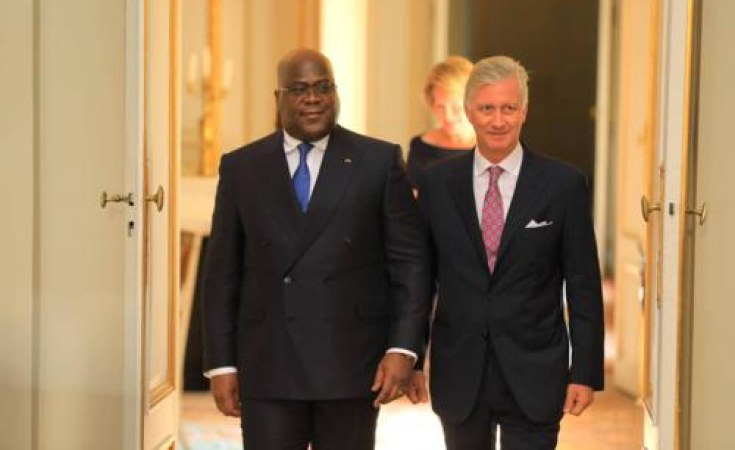Belgium's King Philippe expressed his "deepest regrets" for the pain inflicted during his country's colonisation of the Democratic Republic of Congo, but stopped short of formally apologising for exploitation, racism and acts of violence.
"On the occasion of my first trip to the Congo... in front of the Congolese people and those who still suffer today, I wish to reaffirm my deepest regrets for the wounds of the past," King Philippe said Wednesday, addressing a joint session of parliament in the capital, Kinshasa.
"Even though many Belgians were sincerely committed to loving the Congo and its people deeply, the colonial regime was based on exploitation and domination," he said, during his first visit to Congo since taking the throne in 2013.
"This regime was one of unequal relations, in itself unjustifiable, marked by paternalism, discrimination and racism."
Reckoning with the past
Philippe's speech comes two years after he wrote similar regrets in a letter to mark the 60th anniversary of Congo's independence, going further than any of his predecessors in condemning "acts of violence and cruelty" during Belgium's colonial rule.
The colonisation of the DRC was one of the harshest imposed by the European powers that ruled most of Africa in the late 19th and 20th centuries.
During his reign from 1865-1909, King Leopold II ruled Congo as his personal fiefdom, forcing many people into slavery to extract resources for his own profit.
Leopold handed Congo over to the Belgian state in 1908. It continued to rule the colony until its independence in 1960.
Belgium has traditionally said little about colonialism, and the subject has not been extensively taught in schools.
During anti-racism protests in 2020, the country took down a statue in Ghent of King Leopold, and parliament established a commission to examine the historical record. It will issue its final report this year.
Regrets, but no apology
Congolese President Felix Tshisekedi, who had been anticipating the visit, welcomed the King's comments as "another notable step forward", as the two countries seek to heal historical wounds.
MP Daniel Mbau Sukisa told RFI that it is time to turn the page.
"What is important is to look forward. Congo has many challenges. We need rational support from our partners, including Belgium," he said.
'Human Zoo' expo in Belgium's Africa museum highlights colonial past
But some wanted the King to go farther.
"We were expecting reparations," said opposition MP Geneviève Inagosi. "I think Congo's money also built Belgium. Logically, we are expecting Belgium to use its power to rebuild the DRC. Just expressing regrets and saying that we are turning the page is too easy."
Meanwhile opposition Senator Francine Muyumba Nkanga wrote on Twitter: "I salute the speech by the Belgian King. However, in the face of the crimes committed by Belgium regrets are not enough ... we expect an apology and a promise of reparations from him."
Belgium returns sacred mask
Earlier Wednesday, Philippe visited the DRC's national museum in Kinshasa, where he handed over a mask held for decades by Belgium's Royal Museum for Central Africa.
The Kakungu mask, used by the ethnic Suku group in initiation rites, is on "unlimited" loan, the King announced.
"It is a joy to be able to officially return this mask," he said.
The Belgian government last year set out a roadmap for returning art works looted during the colonial era, a sensitive topic in the DRC.
Belgium is also preparing to return a tooth suspected to be the only remains of the DRC's first prime minister Patrice Lumumba, to his family this month.
The Belgian government took partial responsibility in 2002 for the death of Lumumba, who was assassinated by Belgian-backed Congolese separatists in 1961.
His body was dissolved in acid, but the tooth was kept as a trophy by one of his killers, a Belgian police officer.
(with wires)


